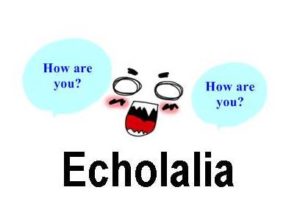 Echolalia is one of the signs of autism in children. It is the imitation or mimicry of words or phrases. If you noticed that your child tends to repeat words and phrases of what you said or from commercial, TV, movies or other people.
Echolalia is one of the signs of autism in children. It is the imitation or mimicry of words or phrases. If you noticed that your child tends to repeat words and phrases of what you said or from commercial, TV, movies or other people.
Imitation of words or phrases is also a part of human development for babies and toddlers as they use it to learn language. But, those with autism, they will continue echolalia to toddler up to childhood, teenagehood and even adulthood.
The common symptom of echolalia is the repetition of phrases and noises that have been heard. It can be immediate or delayed. Immediate when the speaker repeating something right away after hearing it and delayed when the speaker repeating something hours or days after hearing the words or phrases.
The two types of echolalia are interactive or functional echolalia and non-interactive echolalia.
Interactive or functional echolalia is when the speaker is attempting to communicate with another person such as requesting something, providing information, and to attempt verbal exchange.
Non-interactive echolalia is not intended to communicate. This will be used as personal use such as self-stimulation. The speaker may says something that is not related to situational context such as reciting a TV commercial while walking on the classroom.
